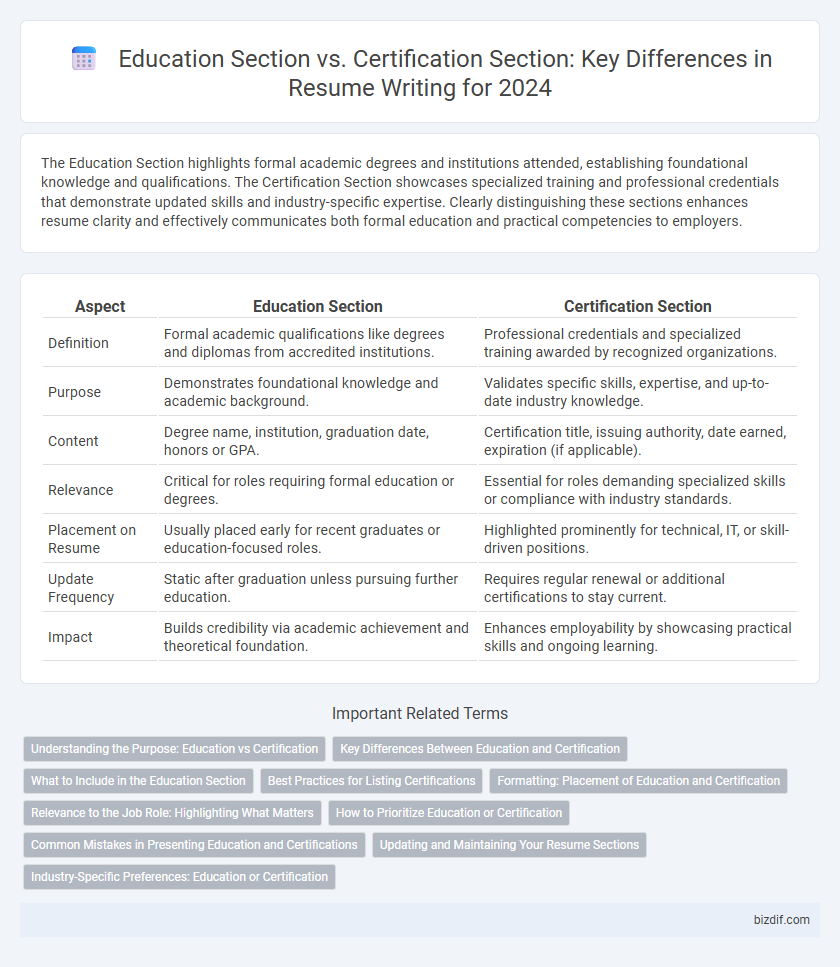The Education Section highlights formal academic degrees and institutions attended, establishing foundational knowledge and qualifications. The Certification Section showcases specialized training and professional credentials that demonstrate updated skills and industry-specific expertise. Clearly distinguishing these sections enhances resume clarity and effectively communicates both formal education and practical competencies to employers.
Table of Comparison
| Aspect | Education Section | Certification Section |
|---|---|---|
| Definition | Formal academic qualifications like degrees and diplomas from accredited institutions. | Professional credentials and specialized training awarded by recognized organizations. |
| Purpose | Demonstrates foundational knowledge and academic background. | Validates specific skills, expertise, and up-to-date industry knowledge. |
| Content | Degree name, institution, graduation date, honors or GPA. | Certification title, issuing authority, date earned, expiration (if applicable). |
| Relevance | Critical for roles requiring formal education or degrees. | Essential for roles demanding specialized skills or compliance with industry standards. |
| Placement on Resume | Usually placed early for recent graduates or education-focused roles. | Highlighted prominently for technical, IT, or skill-driven positions. |
| Update Frequency | Static after graduation unless pursuing further education. | Requires regular renewal or additional certifications to stay current. |
| Impact | Builds credibility via academic achievement and theoretical foundation. | Enhances employability by showcasing practical skills and ongoing learning. |
Understanding the Purpose: Education vs Certification
The Education section highlights formal academic achievements such as degrees and diplomas, emphasizing foundational knowledge and long-term study. The Certification section showcases specialized skills and professional credentials obtained through targeted training or examinations, demonstrating up-to-date expertise and industry relevance. Differentiating these sections ensures clarity in presenting both broad educational background and specific qualifications to employers.
Key Differences Between Education and Certification
The Education section in a resume highlights formal academic achievements such as degrees and diplomas earned from accredited institutions, showcasing foundational knowledge and long-term study. In contrast, the Certification section lists professional credentials and industry-specific qualifications obtained through short-term courses or exams, emphasizing specialized skills and ongoing professional development. Education demonstrates comprehensive learning, while certifications validate current expertise and competency in specific areas.
What to Include in the Education Section
The Education section should highlight formal academic qualifications, including degrees earned, institutions attended, graduation dates, and relevant coursework or honors. Emphasize certifications only if they are academic in nature or integral to your degree program. Avoid listing professional or technical certifications here, as they belong in the Certification section to maintain clarity and relevance.
Best Practices for Listing Certifications
List certifications separately from the education section to enhance clarity and emphasize professional qualifications. Include the full certification name, issuing organization, and completion or expiration date to ensure credibility and relevance. Prioritize certifications that align closely with the job requirements and update this section regularly to reflect current credentials.
Formatting: Placement of Education and Certification
The Education section is typically placed before the Certification section on a resume, highlighting formal academic achievements first. Certifications are listed separately, often in a dedicated section below education or skills, emphasizing specialized training and professional development. Proper formatting with clear headings and consistent style enhances readability and effectively showcases qualifications.
Relevance to the Job Role: Highlighting What Matters
The Education section should emphasize degrees and academic achievements directly related to the job role, showcasing foundational knowledge and relevant coursework that align with employer requirements. The Certification section must highlight industry-recognized credentials and specialized training that demonstrate practical skills and up-to-date expertise tailored to the position. Prioritizing pertinent qualifications in both sections maximizes the resume's impact and relevance to hiring managers.
How to Prioritize Education or Certification
Prioritize the Education section when your academic background directly supports the job requirements or if you hold advanced degrees relevant to the position. Highlight the Certification section if certifications demonstrate current industry expertise, specialized skills, or are mandatory for the role, such as PMP for project management or CISSP for cybersecurity. Evaluate the job description and industry standards to decide which section should appear first, ensuring the most impactful credentials capture the employer's attention.
Common Mistakes in Presenting Education and Certifications
Common mistakes in presenting education and certifications include listing outdated or irrelevant qualifications that do not align with the job requirements, which dilutes the candidate's profile. Mixing credentials in the education section instead of separating certifications into their own section reduces clarity and weakens the overall impact. Failing to include important details such as institution names, dates, and credentialing bodies causes confusion and undermines credibility.
Updating and Maintaining Your Resume Sections
Regularly updating the Education Section with the latest degrees or courses ensures your academic background reflects current qualifications. Maintaining the Certification Section by adding newly acquired licenses or professional credentials highlights ongoing professional development. Keeping both sections accurate and up-to-date enhances resume relevance and increases employability in competitive job markets.
Industry-Specific Preferences: Education or Certification
Industry-specific preferences dictate whether the Education Section or Certification Section holds more weight on a resume; for example, technology and healthcare sectors often prioritize certifications due to rapid advancements and specialized skills. Engineering and finance industries typically emphasize formal education credentials that demonstrate comprehensive theoretical knowledge. Tailoring the resume by highlighting the section valued most by recruiters in a given field enhances job candidate visibility and relevance.
Education Section vs Certification Section Infographic

 bizdif.com
bizdif.com